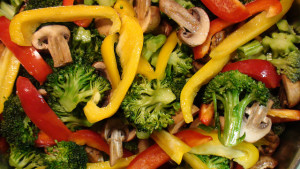By Alan Hewett, Chiltern Landcare member
My partner is a pescetarian. That is not an insult. It means she is a vegetarian who eats fish and other sea food. That has been her choice for twenty years and it is a decision that has considerable health and environmental benefits.
A purely vegetarian or vegan diet, often influenced by ethical desires, runs the risk of deficiencies in several key nutrients, particularly iron. Eating fish overcomes this.
A pescetarian diet has been shown to lower the risk of various diseases. Vegetarians eat less refined grains, added fats, sweets, snack foods and calorific beverages. This reduces the risk of obesity. Fish is low in saturated fats but has significant levels of polyunsaturated omega-3 fatty acids. These have been shown to assist in lowering the risk of heart disease, stroke, high blood pressure and other metabolic disorders.
Although there are concerns about the level of mercury and other toxins in fish, the American Heart Association believes the benefits outweigh the risks.
Those who eschew meat help to save the planet and conserve natural resources. A UN report has stated that ‘animal industries are one of the most significant contributors to the most serious environmental problems.’

Raising animals for food consumption generates more greenhouse emissions than all the cars, trucks, trains, ships and aeroplanes in the world combined. Australian livestock will produce substantial more global warming over the next twenty years than all the coal fired powered stations put together.
In Australia grazing takes up 60% of the continent. The clearing of forests and bush for animal industries has resulted in habitat loss throughout the country, which is the major cause of wildlife becoming threatened, endangered and extinct.
Consider this when you are next eating a hamburger. To produce one hamburger it takes 3.06 kilograms of feed, 200 litres of water and 6.92 square metres of land.
If people ate the plants fed to animals there would be enough food to eliminate world hunger. Cattle and other farmed animals consume a quantity of food equal to the calorific needs of 8.7 billion people- more than the world’s population.
Eliminating meat and poultry from your diet is a big step but the facts demonstrate they account for a significant part of our ecological footprint. I have gradually come around to being a pescetarian under the benign influence of my partner. It’s good for your health and even better for the environment.
